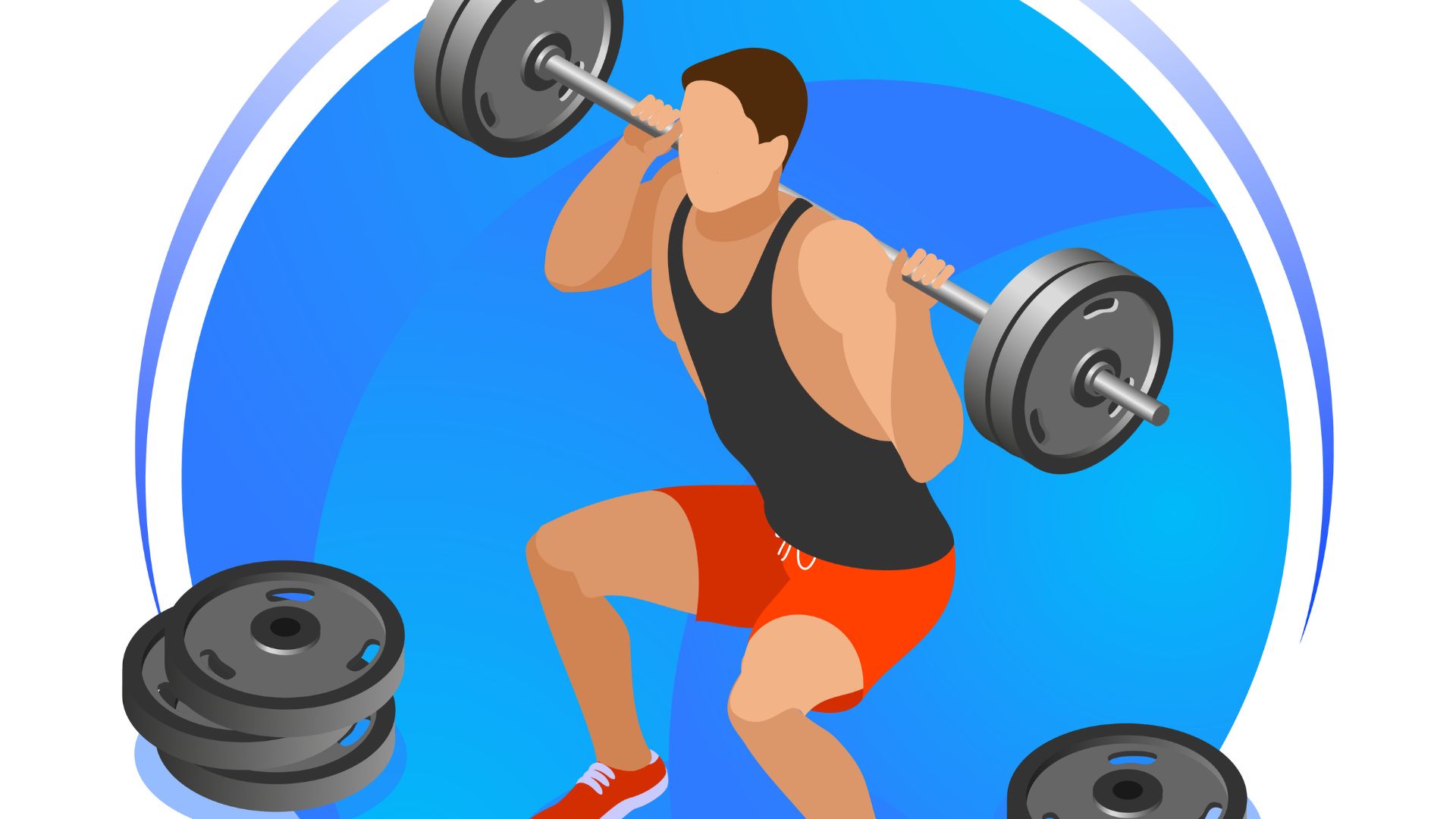Are you trying to build muscle while squatting but not seeing the results you want? You may be wondering if increasing your protein intake can help.
In this article, we will explore how protein helps in muscle building, the recommended protein intake for muscle gain, the best sources of protein, and other factors that affect muscle growth.
Increasing your protein intake can be helpful for building muscle while squatting, but it’s not the only factor that affects muscle growth.
When you squat, your muscles undergo micro-tears that stimulate the muscle-building process. Adequate protein intake is important because it provides the necessary building blocks (amino acids) for muscle repair and growth.
However, other factors such as overall calorie intake, rest and recovery, and proper squat form also play a significant role in building muscle. It’s important to have a well-rounded approach to your fitness routine, which includes a balanced diet, strength training, and rest to optimize muscle growth.
Increasing your protein intake can help.
When you squat, your body is using a lot of muscles in your lower body, including your quadriceps, hamstrings, glutes, and calves. These muscles are all working together to lift the weight and perform the movement.
As you lower down into the squat, your muscles are lengthening and then contracting to lift the weight back up. This process creates micro-tears in the muscle fibers, which is a normal part of the muscle-building process.
To repair and grow those muscle fibers, your body needs amino acids, which are the building blocks of protein.
When you eat protein, your body breaks it down into its individual amino acids, which can then be used for muscle repair and growth.
This is why adequate protein intake is important for muscle growth, especially if you’re doing a lot of strength training exercises like squats.
isn’t the only factor.
However, it’s important to note that protein isn’t the only factor that affects muscle growth. Your overall calorie intake is also important because your body needs energy to perform the squat and repair the muscle fibers. If you’re not eating enough calories, your body may not have the energy it needs to build muscle.
Additionally, rest and recovery are crucial for muscle growth. When you lift weights or perform other strength training exercises, you’re creating stress on your muscles.
Rest and recovery allow your muscles to repair and grow stronger. If you’re not giving your body enough time to rest and recover between workouts, you may not see the muscle growth you’re hoping for.
proper squat form is also important for muscle growth. If you’re not performing the squat correctly, you may not be engaging all the muscles in your lower body effectively.
This can limit your muscle growth and even lead to injury. It’s important to learn proper form and technique when doing any strength training exercise, including the squat.
While increasing your protein intake can be helpful for building muscle while squatting, it’s important to have a well-rounded approach to your fitness routine.
This includes a balanced diet, adequate calorie intake, proper rest and recovery, and proper form and technique when performing strength training exercises like squats.
Here’s a table summarizing how protein helps in muscle building, the recommended protein intake for muscle gain, and what to consider:
| How Protein Helps in Muscle Building | Recommended Protein Intake for Muscle Gain | What to Consider |
|---|---|---|
| Proteins are essential nutrients that play a crucial role in the growth and repair of muscles. They provide the building blocks (amino acids) needed to synthesize new muscle tissue. | The recommended protein intake for muscle gain is about 1.6-2.2 grams of protein per kilogram of body weight per day for adults who regularly engage in resistance training. | It’s important to note that individual protein needs may vary based on factors such as age, gender, activity level, and overall health. |
| Protein also helps to prevent muscle breakdown, especially when consumed after a workout. This is because exercise can cause muscle damage, and protein helps to repair and rebuild damaged muscle tissue. | It’s also important to spread protein intake throughout the day, rather than consuming large amounts at once, as the body can only use so much protein at a time. | Other important factors to consider for muscle gain include consuming enough calories to support muscle growth, engaging in regular resistance training, and getting adequate rest and recovery. |
| Consuming protein with carbohydrates after a workout can also help to replenish muscle glycogen (the stored form of glucose in muscles), which can help to improve recovery and support muscle growth. | Finally, it’s important to choose high-quality protein sources, such as lean meats, poultry, fish, eggs, dairy products, and plant-based sources like legumes and nuts, to ensure that you’re getting all of the essential amino acids your body needs for muscle building. |

Take a well-rounded approach to your fitness routine.
Let’s talk more about the other factors that play a role in building muscle besides protein intake.
First, let’s talk about calorie intake. When you’re trying to build muscle, you need to be eating more calories than you burn in a day. This is known as a calorie surplus.
If you’re not consuming enough calories, your body won’t have the energy it needs to build new muscle tissue. So it’s important to make sure you’re eating enough to support your muscle-building goals.
Rest and recovery.
Next, let’s talk about rest and recovery. When you work out, you’re essentially tearing your muscles down. Rest and recovery allow your body to repair those muscles and grow new tissue.
Without adequate rest, your muscles won’t have the time they need to recover and grow. That’s why it’s important to make sure you’re getting enough sleep and allowing for rest days in your workout routine.
Proper squat form.
Proper squat form is also essential for building muscle. If you’re not using proper form, you may not be targeting the right muscles or engaging them effectively. This can limit your muscle growth and even lead to injury. So it’s important to learn the proper form for any exercise you’re doing, including the squat.
In addition to these factors, strength training is also important for building muscle.
When you lift weights or use resistance bands, you’re creating resistance that your muscles have to work against. This resistance stimulates the muscle-building process and helps to grow new muscle tissue.
Balanced diet
And of course, a balanced diet is essential for overall health and muscle growth. You need a variety of nutrients, including protein, carbohydrates, and healthy fats, to support your body’s needs.
Make sure you’re eating a variety of whole, nutrient-dense foods to fuel your workouts and support muscle growth.
In summary, building muscle is a complex process that involves a variety of factors, including protein intake, calorie intake, rest and recovery, proper form, strength training, and a balanced diet. By focusing on all of these factors together, you can optimize your muscle growth and reach your fitness goals.
Here’s a table summarizing the best sources of protein and other factors that affect muscle growth:
| Best Sources of Protein | Other Factors That Affect Muscle Growth |
|---|---|
| Lean meats (e.g., chicken, turkey, beef) | Sufficient calorie intake to support muscle growth |
| Fish and seafood (e.g., salmon, tuna, shrimp) | Consistent resistance training to stimulate muscle growth |
| Eggs and dairy products (e.g., milk, cheese, Greek yogurt) | Sufficient rest and recovery to allow for muscle repair and growth |
| Legumes and beans (e.g., lentils, chickpeas, black beans) | Proper hydration to support muscle function and recovery |
| Nuts and seeds (e.g., almonds, chia seeds, pumpkin seeds) | Adequate intake of other nutrients important for muscle growth, such as carbohydrates and fats |
| Soy products (e.g., tofu, tempeh, edamame) | Individual factors, such as age, gender, and genetics, that may affect muscle growth |
It’s worth noting that while protein is important for muscle growth, it’s just one piece of the puzzle.
Other factors, such as calorie intake, resistance training, rest and recovery, hydration, and nutrient balance, all play important roles in supporting muscle growth.
Additionally, individual factors such as age, gender, and genetics can also influence muscle growth potential.
here is a tabular summary of the factors that contribute to building muscle while squatting:
| Factor | Explanation |
|---|---|
| Protein intake | Provides the necessary building blocks (amino acids) for muscle repair and growth |
| Calorie intake | Eating more calories than you burn in a day is necessary for building new muscle tissue |
| Rest and recovery | Adequate rest and recovery allow your muscles to repair and grow |
| Proper form | Using proper form ensures you’re targeting the right muscles and engaging them effectively |
| Strength training | Lifting weights or using resistance bands stimulates the muscle-building process |
| Balanced diet | Eating a variety of whole, nutrient-dense foods supports your body’s needs and fuels your workouts |
By focusing on all of these factors together, you can optimize your muscle growth and achieve your fitness goals.
Conclusion
In conclusion, building muscle while squatting requires more than just increasing your protein intake. While protein is important for muscle repair and growth, other factors such as calorie intake, rest and recovery, proper form, strength training, and a balanced diet are also crucial.
By taking a well-rounded approach to your fitness routine and paying attention to all of these factors, you can optimize your muscle growth and achieve your fitness goals.
So, make sure you’re eating enough calories to support your muscle-building goals, allowing for rest and recovery, using proper form, engaging in strength training, and eating a balanced diet. With these strategies in place, you’ll be on your way to building strong, healthy muscles.

Hey there, it’s Mike Rrsq, the Editor-in-Chief over at Jsquat.com, and I’m absolutely obsessed with all things squat fitness! I’ve been lucky enough to get some serious recognition for my work in this field. With a solid background in the fitness and wellness industry, I’ve been there right from the get-go, helping shape this website into what it is today.
You see, I’m not just the boss around here; I’m also a passionate contributor. I love sharing my insights through my articles, and trust me, they’re not your run-of-the-mill stuff. Each piece I write is a labor of love, filled with my expertise and real-world experience in the fitness universe. So, if you’re into fitness and looking for some inspiration, you’re in the right place!

